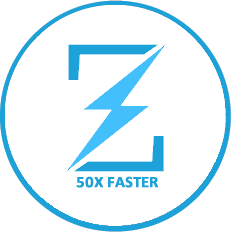AMD Ryzen 9950X (Zen 5) CPU
Experience the fastest hosting servers on our high-frequency compute infrastructure powered by AMD Ryzen 9950X and 9900X, which boast the highest single-thread performances among all server processors, as seen on PassMark and other independent third-party benchmarks.
A high single-thread performance boosts PHP MySQL performance and allows faster page load times for WordPress, Joomla, Magento, and other PHP MySQL-based websites.
MechanicWeb was among the first to launch AMD Ryzen 9950X powered hosting in August 2024. We have coupled it with DDR5 ECC RAM and some of the fastest PCIE 5.0 NVMe SSDs arranged in RAID arrays to deliver leadership performance for WordPress and PHP/MySQL-based websites. RAID grants fault tolerance and prevents data loss in the event of a drive or power failure by storing data across multiple drives.
AMD Ryzen has built-in hardware-based security to thwart cyber attack and bolster data security. It supports ECC Memory, Secure Boot, Secure Memory Encryption, AES Encryption, Nested Virtualization, Secure Encrypted Virtualization, Advanced Vector Extensions, Trusted Security Platform, and many other features to run a secure and fast server. Unlike other CPUs, it runs faster with security mitigations enabled. Learn more on AMD Ryzen Processors for Server: https://www.amd.com/en/solutions/hosting
AMD Ryzen 9950X powered Shared, Reseller, Semi Dedicated, VPS, Quasi Dedicated, and Dedicated Server Hosting is available on new servers in Dallas (USA) and Los Angeles (USA). It will soon be available in more locations. We also have AMD Ryzen 7950X and 7950X3D powered hosting in Dallas (USA), Germany (EU) and the United Kingdom (EU).
AMD Epyc 4004
Zen 4 AMD Epyc high frequency CPUs are Epyc's alternatives to Zen 4 Ryzen. They offer the same performance as their Ryzen counterparts. They are validated and are the fastest CPUs in single-thread performance among all Epyc processors. They have the same single and multi-thread performance as Ryzens and deliver the same fast page load times.
AMD Epyc 4464P powered Shared, Reseller, Semi Dedicated, VPS, Quasi Dedicated, and Dedicated Server Hosting is available in Singapore (Asia).
| Location |
Service |
CPU |
ST Performance |
RAM |
NVMe SSD |
| Los Angeles |
Web, Reseller, Semi, VPS, Quasi |
9950X |
4,741 |
DDR5 |
PCIE 5.0 |
| Dallas |
Web, Reseller (cPanel), Semi, VPS, Quasi |
9950X |
4,741 |
DDR5 |
PCIE 5.0 |
| Dallas |
Reseller (DirectAdmin) |
7950X |
4,279 |
DDR5 |
PCIE 4.0 |
| Germany |
Web, Reseller, Semi, VPS, Quasi |
7950X3D |
4,143 |
DDR5 |
PCIE 4.0 |
| United Kingdom |
Web, Reseller, Semi |
7950X |
4,279 |
DDR5 |
PCIE 4.0 |
| Singapore |
Web, Reseller, Semi, VPS, Quasi |
4464P |
4,124 |
DDR5 |
PCIE 4.0 |



